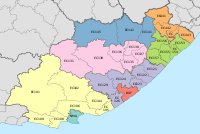|
Sunday's River Valley Local Municipality
Sundays River Valley Municipality (Xhosa: uMasipala wase Sundays River Valley; Afrikaans: Sondagsriviervallei Munisipaliteit) is a local municipality within Sarah Baartman District Municipality, in the Eastern Cape province of South Africa. It has a total population of nearly 70,000 people. The municipality is one of the key production areas for citrus in South Africa. It also encompasses the Addo Elephant National Park and other significant areas of nature conservation. Main placesThe 2001 census divided the municipality into the following main places:[3]
PoliticsThe municipal council consists of sixteen members elected by mixed-member proportional representation. Eight councillors are elected by first-past-the-post voting in eight wards, while the remaining eight are chosen from party lists so that the total number of party representatives is proportional to the number of votes received. In the election of 1 November 2021 the African National Congress (ANC) won a majority of ten seats on the council. The following table shows the results of the election.[4]
Geography and land useThe municipality derives its name from the 250 km (160 mi) long Sundays River, the fastest flowing river in South Africa. The river winds its way through the Zuurberg mountains and passes Kirkwood in the fertile Sundays River Valley; it empties into the Indian Ocean at Algoa Bay near Port Elizabeth. To the north of Kirkwood lies the Rietberg mountain with the Uyepoort (Uye gateway) that provides passage to the Zuurberg mountains and the Greater Addo Elephant National Park. A panoramic view of Kirkwood and the orange groves is visible from The Lookout. The Lookout is also known as a site where large dinosaur fossils have been dug up by archeologists. The first complete dinosaur fossil to be found in South Africa, nicknamed "Kirky," was found not far from Kirkwood.[5] The municipality comprises three regions with distinct characteristics:[6]
DemographicsThe municipality's population (as of 2005) is 63% urban and 37% rural. 64% of the population are 34 years old or younger. Suggested unemployment rate figures range from 20% to 44%. In 2001, among persons older than 20 years, 5461 had had no schooling, 7642 had had some primary education, 2487 had completed primary school, another 6594 had had some secondary education, 2363 had finished Grade 12, and 827 had gone on to some higher level of schooling.[6] Among individual residents, 41.63% earned no income in 2001; 45.74% earned R800 or less per month; 6.96% earned between R801 and R1600 per month; 5.71% earned over R1600 per month. Approximately half of the municipality's households live on less than R800 (US $110) per month.[6] EconomyThe agricultural industry, centering mainly around citrus fruit, dairy and chicory farming, plays a major role in the economy and functioning of the region; it alone counts for 31.2% of the GGP and 47.7% of employment. Approximately 25% of South Africa’s navel oranges and 50% of the country’s lemons are produced in the Sunday’s River Valley. The area exports million of cartons of navel oranges per year, earning more than R1 billion in foreign exchange for the country. Other agricultural products include vegetables, potatoes, maize, wheat, chicory, flowers and rye grass. Ecotourism is another driving force of the local economy, thanks to the presence of vast unspoiled wilderness areas. Addo receives about 115 000 visitors each year, of which 50% are foreign, and this figure is on the increase.[6] References
External links |
||||||||||||||||||||||||||||||||||||||||||||||||||||||||||||||||||||||||||||||||||||||||||||||||||||||||||||||||||||||||||||||||||||||||||||||||||||||||||||||||||||||||||||||||||||||||||||||||||||||||||||||||||||||||||||||||||||||||||||||||||||||||||||||||||
Portal di Ensiklopedia Dunia



